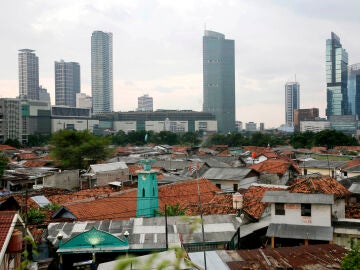
The Indonesian Government wants to limit water use underground at 100 cubic meters per month per family to alleviate the sinking of cities like Jakarta, which sinks about 7.5 centimeters on average per year.
The measure, which has been announced by the Ministry of Energy and Mineral Resources, Muhammad Wafid, establishes that those who use more than 100 cubic meters will need a special permit, while there will be no limit for the consumption of tap water. According to authorities, most families use an average of 30 cubic meters of groundwater per month.
The sinking of Jakarta is one of the reasons why the president, Joko Widodo, decided in 2019 the transfer of the capital to the island of Borneoabout 1,000 kilometers east of Jakarta, located on the island of Java.
The new capital, Nusantara is scheduled to open in 2025 with an estimated budget of 32 billion dollars, although complete construction will take place around 2045.
The transfer of the capital has been a recurring project of successive governments since the time of Sukarno, who ruled Indonesia between 1945 and 1967 and who proposed then the city of Palangkaraya, on the island of Borneo, but has not been executed until Widodo.
Jakarta, which is located in 40% below sea levelit sinks about 7.5 centimeters on average per year, according to official estimates, one of the fastest rates on the planet, and therefore suffers from frequent flooding, traffic jams and pollution. The still Indonesian capital, located in the northwest of the island of Java, has a population of about ten million peoplehaving surpassed its rapid growth to the adaptation of its basic infrastructure.
Source: Lasexta
Ricardo is a renowned author and journalist, known for his exceptional writing on top-news stories. He currently works as a writer at the 247 News Agency, where he is known for his ability to deliver breaking news and insightful analysis on the most pressing issues of the day.












